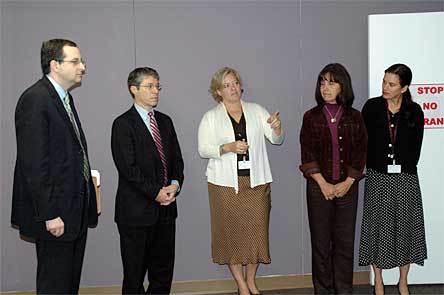TULALIP — The Tulalip Tribes Reservation received a visit Aug. 26 from U.S. Deputy Attorney General David Ogden and Associate Attorney General Tom Perrelli, as they announced the awarding of funds to benefit not only the Tulalip Tribes, but several other Washington state tribal governments and law enforcement agencies.
Ogden and Perrelli began their tour by stopping by the Tulalip Police Department and the beda?chelh Health and Social Services Department. Bonnie Juneau, of the Tulalip Police Department, provided a timeline of a few of the police department’s accomplishments to the visiting U.S. attorneys general.
“In 2003, the department became a 24-hour dispatch center,” Juneau said. “In 2005, we implemented computer-aided dispatch, with a digital logging recorder for phone and radio.”
According to Juneau, the department has 50 staff members, of which 32 are commissioned officers. Of those officers, she estimated that more than 20 are cross-commissioned with Snohomish County, “with more to come.”
Ogden and Perrelli then took a look at one of beda?chelh’s interview rooms for women and children, since beda?chelh has a Child Advocacy Center and a STOP Violence Against Indian Women program, before the visiting U.S. attorneys general spoke at the Tulalip Tribal Center.
The Department of Justice has awarded more than $2.16 million in Recovery Act funds to three Washington state tribal governments, by the Office on Violence Against Women, and more than $3.3 million in fiscal year 2009 Community Oriented Policing Services grants to 16 Washington state tribal law enforcement agencies.
Of the Recovery Act Violence Against Women grants, $899,999 will go to the Tulalip Tribes to renovate a Tribal facility for use as the Legacy of Healing Advocacy Center and Safe House. These funds will create five new full-time jobs, including four residential aides and a manager to oversee the program. The Tribes will hire a contractor for building and security renovations, and a consultant to develop shelter program operating policies and procedures. The Tribes will also implement staff and volunteer training, community outreach and education, and ongoing education and support groups for the Safe House and transitional housing clients themselves.
Of the 2009 COPS grants, the Tulalip Police Department received $423,170 to hire two new officers. This grant will fund those two positions for three years.
Tulalip Tribes Chair Mel Sheldon spoke highly of the “substantial discussions” that the Tribes have had with the Department of Justice, in which the Tribes explained the circumstances facing their law enforcement and community as a whole. Ogden followed Sheldon’s introduction by praising the Tribes’ police and justice institutions for what they’ve done with “limited resources,” and deemed the visit a “learning experience” for the U.S. attorneys general.
Ogden had worked under current U.S. Attorney General Eric Holder, back when Holder was Deputy Attorney General to Janet Reno, and he described tribal law enforcement as a point of focus for himself, Perrelli and Holder back then as much as now.
“We’ve returned nearly a decade later and found that much remains to be done,” Ogden said. “The impact of violent crime is staggering and unacceptable. You’re done a great job with the resources you have, but those resources are wholly inadequate.”
Ogden deemed it the Department of Justice’s legal duty to help tribal law enforcement prosecute violent crimes, and asserted that trust between tribal and federal governments is based in part on the federal government fulfilling what he defined as its responsibilities to the tribal governments. To that end, he announced that the Department of Justice will conduct a tribal nations listening conference in Minneapolis, Minn., Oct. 28-29.
Perrelli noted that these funds should have “an immediate impact” on the quality of services offered to children and women who are survivors of violence, by providing advocacy and support services for those who need to be kept safe in emergency situations and those who choose to leave abusive relationships.
“Tribal nations have already done so much, much of it without federal government assistance,” said Perrelli, who added that this year marks the 15th anniversary of the Violence Against Women Act. “They take these issues seriously, because they’re extraordinarily important, and we must do better.”
Ogden concluded his remarks by pledging more resources for and increased partnership with tribal governments and law enforcement agencies from the Department of Justice. Sheldon thanked Ogden and Perrelli by giving them blankets.
“These funds show the Department of Justice is serious about helping our communities’ policing and judicial systems,” said Sheldon, who pointed out that the Tulalip Tribes also redirect gaming dollars into these services. “It sends a message across America, and gives people hope that another life can be had.”



